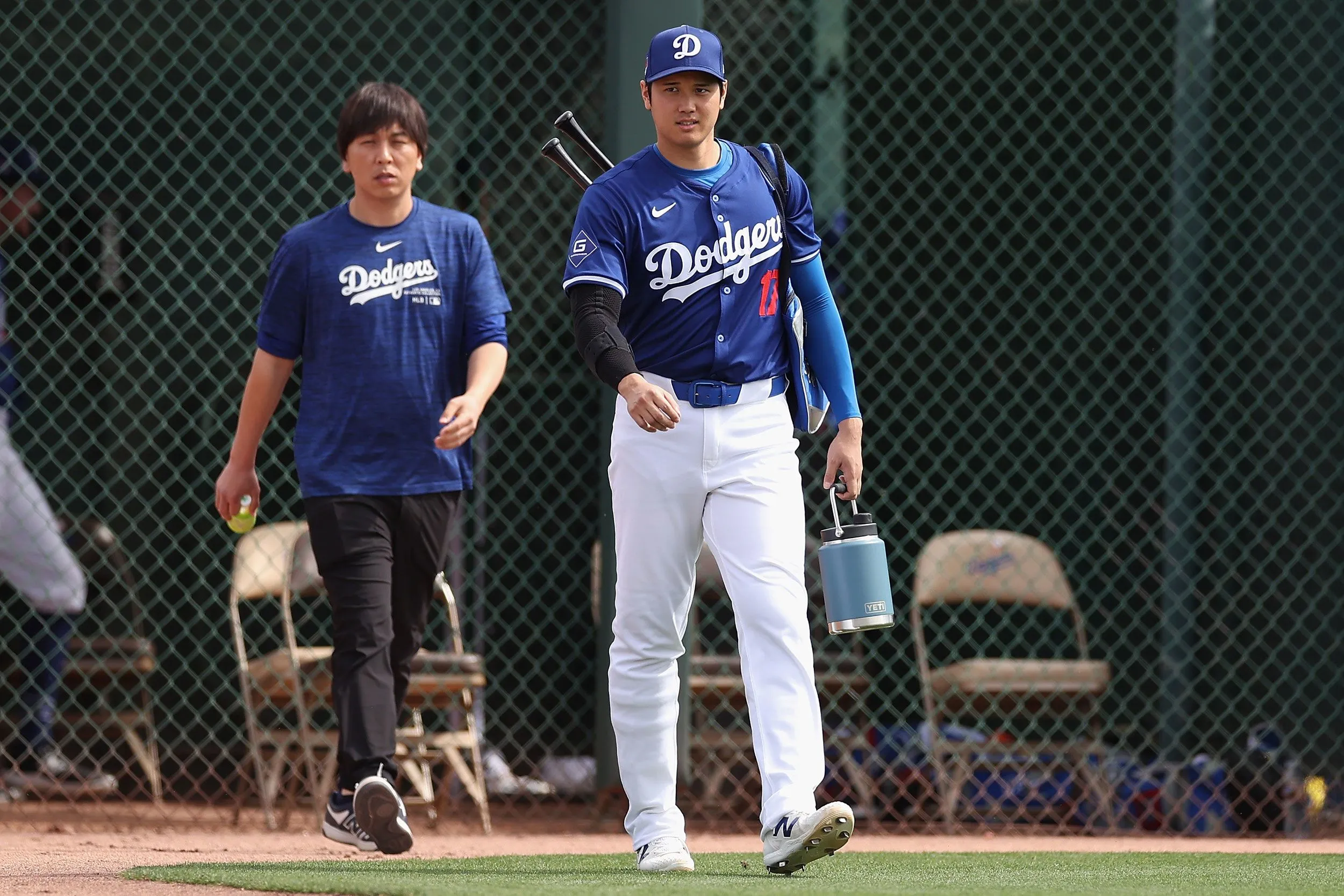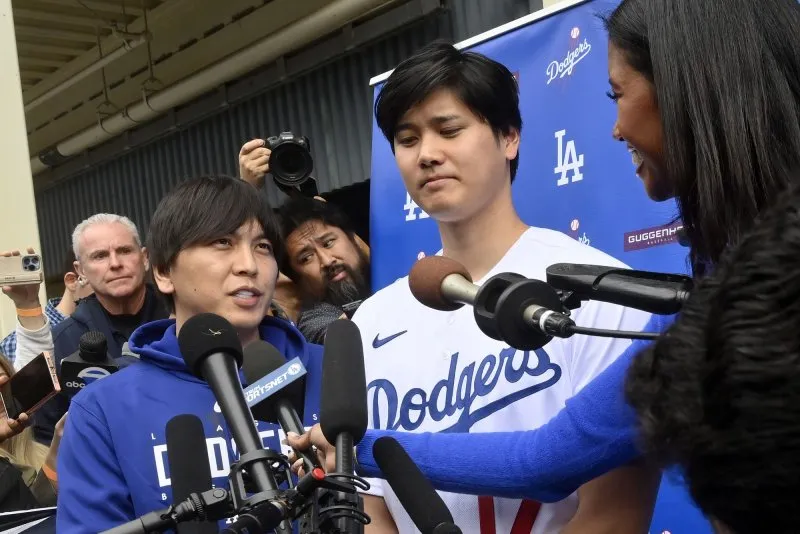

Shohei Ohtani’s Former Interpreter Jailed for $17M Theft – His Confession Shocked the World!
In a scandal that has shaken the foundation of trust in Major League Baseball and stunned fans across the globe, Shohei Ohtani’s former interpreter, Ippei Mizuhara, has been sentenced to federal prison for stealing nearly $17 million from the Japanese superstar. The man once considered one of Ohtani’s closest allies—his voice, his translator, his bridge to America—has now become the centerpiece of one of the most bizarre betrayals in modern sports history.

What began as whispers of financial impropriety turned into an explosive saga involving gambling addiction, fraudulent wire transfers, and a heart-wrenching betrayal of friendship. But what truly shocked the world wasn’t just the theft—it was the confession that followed. The calm, measured words of a man admitting to years of deceit sent chills down the spines of reporters, fans, and athletes alike.
From Friendship to Fallout: A Relationship Built on Trust
For years, Shohei Ohtani and Ippei Mizuhara were inseparable. Since Ohtani arrived in the United States in 2018, Mizuhara served not only as his interpreter, but as his cultural confidant, schedule coordinator, and friend. On camera, Mizuhara translated interviews with smooth precision, often joking with Ohtani, giving insight into his thoughts and character. Off camera, they traveled together, ate together, and trusted each other in ways few outsiders could understand.
In many ways, Mizuhara helped Ohtani transition into American baseball stardom with grace. Ohtani, who is famously reserved, rarely speaks English in public, relying heavily on Mizuhara to express his thoughts. Their bond was so tight that many within the Angels and later the Dodgers organization saw Mizuhara as an extension of Ohtani himself.
Which is why, when the news broke in early 2024 that millions of dollars had been embezzled from Ohtani’s accounts, no one could believe it. The initial reports were so surreal that fans assumed a mistake had been made. But the truth was far darker than anyone had imagined.
The Discovery: How $17 Million Vanished
The unraveling of the scandal began quietly. Ohtani’s financial team, during a routine review of bank records, discovered a pattern of unauthorized wire transfers. The amounts were not small—some were as high as $500,000 per transaction. As investigators dug deeper, they found that over a period of nearly two years, more than $16.9 million had been transferred to accounts tied to illegal sports betting operations.
Initially, Mizuhara claimed the transactions were approved by Ohtani. In a stunning early interview, he told ESPN that Ohtani was helping him pay off gambling debts. But within days, that narrative collapsed. Ohtani’s legal team quickly released a statement denying any involvement, saying that Shohei had no knowledge of the transfers and had been “the victim of massive theft.”
By the time the federal investigation ramped up, Mizuhara had gone silent—and the truth began to emerge.
The Confession: A Moment That Stunned the Globe
When Ippei Mizuhara finally appeared in court and delivered his confession, it wasn’t the rage or tears that shocked the world. It was the tone—soft, deliberate, almost eerily calm. He admitted to not only accessing Ohtani’s bank accounts without permission, but also forging authorizations, lying repeatedly to financial advisors, and maintaining a web of deception to fund his growing gambling addiction.
“I betrayed the trust of the one person who gave me everything,” Mizuhara said in court, his voice shaking but clear. “Shohei Ohtani is a good man. He didn’t know. I lied to him every day.”
In that moment, the courtroom fell silent. Even hardened reporters couldn’t hide their astonishment. The image of Ohtani—a global icon of humility and grace—being duped by his closest companion was almost too painful to process.
The federal judge overseeing the case called Mizuhara’s actions “a staggering abuse of trust” and sentenced him to five years in federal prison, along with full restitution and a lifetime ban from working in any MLB-affiliated organization.
The Fallout: Shockwaves Across the Baseball World
As news of the confession and sentencing spread, Major League Baseball scrambled to assess the damage. The incident raised uncomfortable questions about how much autonomy high-profile players like Ohtani give to those around them, and how well organizations protect their athletes—particularly international stars—from financial exploitation.
Commissioner Rob Manfred called the situation “deeply troubling”, and MLB has since launched a task force to explore better support systems for non-English-speaking players. Several teams have already announced new protocols for handling player finances, particularly involving interpreters and personal staff.
Meanwhile, fans reacted with a mix of sympathy and disbelief. Social media was flooded with messages of support for Ohtani, but also anger at how someone so close could carry out such a betrayal. In Japan, where Ohtani is a national hero, the reaction was even more emotional. Prominent Japanese outlets ran front-page stories with headlines like “The Knife Behind the Smile” and “Ohtani’s Shadow.”
But amid the chaos, Ohtani’s own response stood out.
Ohtani’s Silence—and Strength
For weeks after the story broke, Shohei Ohtani remained silent. No interviews. No statements. Just baseball. Many assumed he was crushed—betrayed not just financially, but personally. And yet, as the Dodgers continued their campaign, Ohtani kept performing with clinical excellence. Home runs. Strikeouts. Stolen bases. It was as if he had built a wall between his private pain and his public performance.
Finally, at a carefully arranged press conference, Ohtani addressed the issue head-on. “I am still processing what happened,” he said quietly, “but I will move forward. I have a job to do, and that’s to play baseball. I hope people can understand that I was not part of any wrongdoing. I was betrayed, but I will not let that define me.”
The crowd gave him a standing ovation. In a world increasingly defined by scandal and cynicism, Ohtani’s dignity in the face of such a personal crisis became a symbol of grace under pressure.
The Bigger Picture: Trust, Money, and Fame
This incident was more than a crime. It was a wake-up call. In the era of multimillion-dollar contracts and global endorsements, professional athletes often live in bubbles, surrounded by layers of assistants, advisors, and handlers. And as the Mizuhara scandal revealed, not all those in their inner circle can be trusted.
Financial crimes in sports aren’t new, but the uniqueness of this case lies in its emotional depth. This wasn’t just a business manager embezzling money. This was a best friend, a confidant, someone who traveled the world with Ohtani, sharing laughs, secrets, and late-night meals. To steal money is one thing. To do it while pretending to care is another.
As experts have since noted, the real loss here wasn’t just $17 million—it was a sense of safety. Athletes like Ohtani, who rely on their teams to handle language, finances, and logistics, are left wondering: Who can I really trust?
What Happens Now?
While Ippei Mizuhara begins his prison sentence, Ohtani is attempting to move on. Reports suggest he has hired a new interpreter, one selected through multiple background checks and with no prior relationship to Ohtani. The Dodgers organization is said to be supporting Ohtani with additional security and financial monitoring tools to ensure this can never happen again.
MLB, meanwhile, continues its internal review, and other teams are quietly revisiting how they handle foreign talent. It’s likely that more training and transparency measures will be introduced across the league in the coming months.

And fans? They’re still reeling. But they’re also rallying. From Tokyo to Los Angeles, the global baseball community has united behind Ohtani—not because he’s a superstar, but because he’s a victim who handled betrayal with unshakable dignity.
Conclusion: A Scandal That Redefined Loyalty in Sports
In the end, “Shohei Ohtani’s former interpreter jailed for $17M theft” is more than just a headline. It’s a painful parable about fame, trust, and the dark side of human relationships. It reminds us that betrayal often comes not from strangers, but from those we allow into our most intimate spaces.
Yet through it all, Ohtani has shown what it means to stay composed when the world is watching. He didn’t lash out. He didn’t break down. He did what he always does—he let his actions speak louder than any words.
And perhaps that’s what makes this story so unforgettable—not the crime, but the quiet strength of the man who endured it.


















